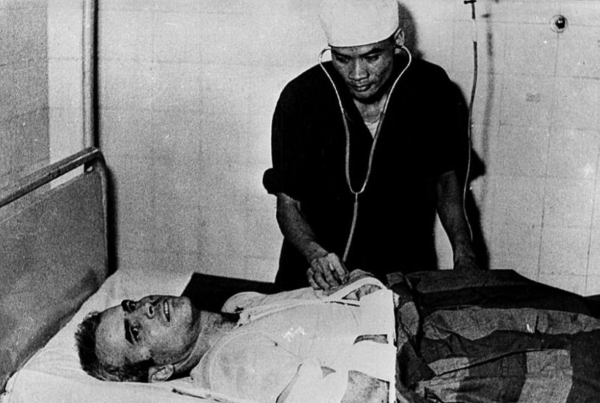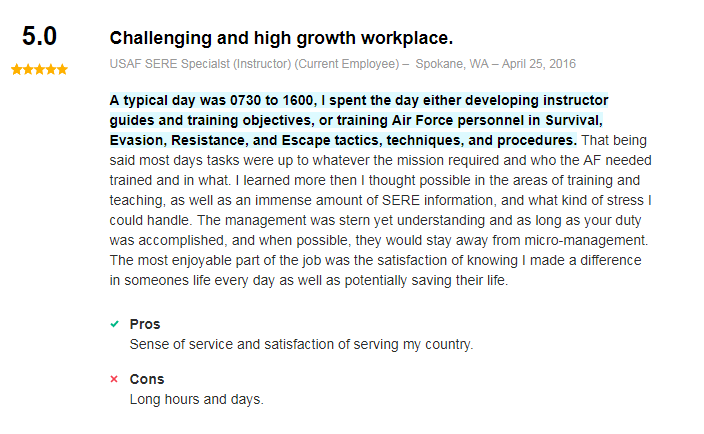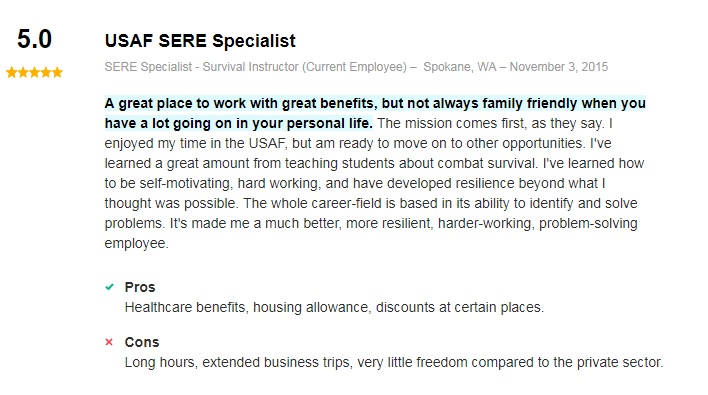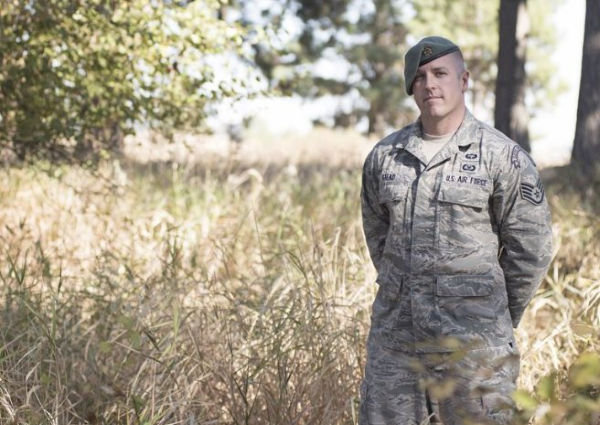Among the Air Force’s most valuable assets are the pilots and other men and women on aerial platforms who spend years training to become proficient at their airborne jobs.
Many times US Air Force pilots and crews put themselves in harm’s way by flying over hostile territory to get their missions done.
This also brings with it the risk of these aircrew members being shot down hundreds or thousands of miles from friendly territory.
Captured pilots and Airmen become a valuable commodity to enemy combatants, and they are sometimes tortured, beaten, and even killed while in captivity.
Jump To A Section
SERE Requirements And Qualifications
What’s Life Like As A SERE Specialist?
Not to mention, they are often coerced into being used as propaganda tools for the enemy.
A well-known example of that was the late Senator John McCain, who was shot down over Vietnam and subsequently held captive for 5 1/2 years.

A pilot or aircrew member’s best chance of not being caught when they go down in hostile territory comes from the special training they get from a little-known group of Air Force professionals called SERE specialists.
SERE stands for survival, evasion, resistance, and escape.
Any Air Force member has to go through 3 weeks of SERE training in order to be allowed to become a pilot or a part of an aircrew.
SERE Specialists are dedicated Air Force professionals that take very seriously their job of giving pilots and other aircrew members a fighting chance to evade capture when they go down in hostile areas.
It is one of the most unknown, most misunderstood, and undermanned careers in the United States Air Force.
Although they are not considered Special Forces soldiers (like Navy SEALs or Green Berets), their training is almost as intense and it takes a smart and physically fit individual to fill this Air Force role.
SERE training produces some of the military’s toughest and most resourceful members, despite the fact that there is little chance that they will ever be involved in combat.
Air Force SERE Specialist Requirements and Qualifications
Here are the requirements that must be fulfilled in order to enter into training to become an AIR Force SERE specialist.
ASVAB and TAPAS Requirements
- Minimum ASVAB score of 55 in the general category
- Minimum score of 55 required on the SERE selection model of the Tailored Adaptive Personality Assessment System (TAPAS)
Additional Qualifications
-
- Be between the ages of 17 and 39
- Possess a GED or high school diploma
- Have the equivalent of the 11th grade or better reading level
- Have normal color vision and depth perception
- Be able to speak English clearly and distinctly as demonstrated by passing the Reading Aloud Test.
- Meet psychological requirements outlined in AFI 48-123
- Meet Flying Class III physical and psychological qualifications for SERE Specialist and parachutist duty
- Successful completion of 7.5 weeks of Air Force Basic Military Training held at Joint Base Lackland in San Antonio, TX (Not required of those with prior military experience or training)
- Completion of a current Single Scope Background Investigation (SSBI) that leads to the ability of an Airman being granted access to Secret or higher-level material
Related Article – Air Force PT Test Standards
Training and Career Path to Become an Air Force SERE Specialist
It takes almost a year for an Airman to become qualified to fill the duties in the Air Force that are required of a SERE training specialist.
SERE Training Pipeline
Here are the training phases required in order to complete the SERE training pipeline.
SERE Specialist Selection (SSS)
This training takes place over a 15-day period at Joint Base San Antonio/Chapman Annex in Texas.
It’s a course designed to severely test a SERE candidate’s physical and mental capacities.
This ensures that an enlisted member is able to handle the physical and mental demands that it takes to become a SERE specialist in the Air Force.
During this course, a SERE recruit will also have to take and pass the Rescue Operator Physical Fitness Test (ROPFT)
The minimum scores to pass this test for a SERE specialist include:
- 200-meter swim – freestyle, breaststroke, and sidestroke – 10:00-minute time limit
- 1.5-mile run – completed in under 11:00 minutes
- Pull-ups (1 min) – 8 reps
- Sit-ups (2 min) – 48 reps
- Push-ups (2 min) – 48 reps
In addition to passing the ROPFT, the SERE candidate will also have to carry a 65-pound rucksack four miles in less than one hour.
SERE Specialist Training (SST) Course
This is the heart and soul course for those wishing to become SERE specialists.
The training is a mentally and physically demanding 5 ½ month-long course.
It’s held at Fairchild AFB outside of Spokane, Washington.
During their time spent in this course, a SERE recruit will learn to survive in several different climates.
These include surviving in the mountains, deserts, tropics, and even in the open ocean.
SERE recruits are also taught wilderness first aid, rough land evacuation techniques, and how to win at hand-to-hand combat.
Recruits will also be taught various types of water egress techniques, non-parachuting water survival, and go through one day of emergency parachute training.
Related Article – Navy Aircrew Survival Equipmentman (PR): Career Details
During SST training recruits will also become part of an actual 3-week SERE class that they one day will teach themselves.
The United States Army Airborne School – “Jump School”
This is a 3-week course that will give a SERE recruit basic paratrooper training.
It’s held at the United States Army Infantry School located at Fort Moore, Georgia.
Modern Army Combatives Program (MACP)
Immediately after their jump school session is complete, SERE recruits will stay right at Fort Moore, Georgia to attend MACP training.
This is a 5-day course designed to train military members in the basics of hand-to-hand combat and other close-quarters fighting techniques.
SERE Training Graduation
SERE training is so demanding that roughly 85% of all of those that enter the SERE pipeline training will not make it through the course.
Upon completion of the training, the new SERE member will be given their coveted green beret, the symbol of membership into the US Air Force SERE Specialist brotherhood.
This Air Force-produced YouTube video gives a more complete overview of the SERE training pipeline.
How Much Are Air Force SERE Specialists Paid?
As with all branches of the military, Air Force enlisted base pay is determined by rank and time in service.
Most newly enlisted SERE specialists will start out at the rank of Airman Basic (E-1).
If a new recruit has prior SERE applicable skills or training, this may be bumped up to an Airman (E-2) or Airman First Class (E-3) rank.
Here is the current base paytable for Air Force enlisted members:
| Insignia | Pay Grade | Rank | Abbreviation | 2023 Minimum Monthly Pay |
|---|---|---|---|---|
| E-1 +4 months | Airman Basic | AB | $1,917.60 | |
| E-2 | Airman | Amn | $2,149.20 | |
| E-3 | Airman First Class | A1C | $2,259.90 | |
| E-4 | Senior Airman | SrA | $2,503.50 | |
| E-5 | Staff Sergeant | SSgt | $2,730.30 | |
| E-6 | Technical Sergeant | TSgt | $2,980.50 | |
| E-7 | Master Sergeant | MSgt | $3,445.80 | |
| E-8 | Senior Master Sergeant | SMSgt | $4,957.20 | |
| E-9 | Chief Master Sergeant | CMSgt | $6,055.50 | |
| E-9 | Command Chief Master Sergeant | CCM | $6,055.50 | |
| E-9 | Chief Master Sergeant Of The Air Force | CMSAF | $6,055.50 |
Other forms of pay and incentives that an Airman may be entitled to include such things as:
- Housing allowance for those that live off base (BAH)
- Subsistence allowance (Food – BAS)
- Temporary duty pay
- Hazardous duty pay
- Flight pay
- Cost of living incentives
- Tuition reimbursement
Of course, all healthcare for any Air Force enlisted member is always 100% paid for.
As was mentioned, this is currently an undermanned Air Force career field.
That means reenlistment into this AFSC often entitles those who do it to some very generous monetary bonuses.
What’s Life Like as an Air Force SERE Specialist?
Once an Airman has completed their rigorous SERE training, they will then become a member of a select group of individuals known collectively as “The Walking Air Force.”
At this point, SERE recruits will go from being trained in SERE tactics to conducting the actual SERE training sessions themselves.
Their duties will include:
- Prepare pilots, aircrew (like loadmasters), and other Air Force members with a high risk of capture to escape, evade and return with their honor intact from any type of survival situation
- Instruct pilots and aircrew members to survive under the following climatic conditions: arctic, desert, tropical, ocean, and temperate
- Teach SERE course attendees the basics of wilderness living, shelter building, fire making, map and compass navigation, proper backpacking techniques, and food and water procurement
- SERE trainers will also need to teach SERE course attendees wilderness medicine and basic first aid, signaling to get rescued, escape and evasion techniques, and prisoner of war (POW) survival and resistance methods
Throughout their Air Force career, SERE Training Specialists will be expected to stay in excellent physical condition.
They will be subjected at times for short temporary duty assignments but most of this is training related and takes place inside the continental USA.
Despite the fact an Airman in this career field will spend most of their time at a single location; a SERE specialist can still expect to spend several weeks at a time away from home and family as their job requires.
Job Reviews
Here is what two former SERE specialists had to say about their time spent in the USAir Force in reviews posted on the website Indeed.com:


Here is a YouTube video that gives a little insight as to what it’s like to be an Air Force SERE specialist:
Air Force SERE Specialist Civilian Career Opportunities
Although there is not an extremely high demand for former Air Force SERE personnel in the civilian job force, there are related positions available if one takes the time to look.
Many of these jobs are military-related either directly or through government subcontractors.
Here are some of the civilian positions that Ex-Air Force SERE specialists are capable of filling:
- Sports and recreation positions
- Government and civilian subcontracted SERE training positions
- Law enforcement and firefighting
- Survivalist training positions
Some civilian and government employers of former SERE specialists include:
- People, Technology & Processes – Camp Lejeune, NC
- Valiant Integrated Services – Fort Liberty, NC
- General Dynamics Information Technology – Fort Novosel, AL
- PD Systems Inc. – Camp Mackall, NC
- Prevailance Inc. – San Diego, CA
- Reservoir International – Lackland AFB, TX
Many of these positions are listed with starting pay at $45,000 or better per year.
Related Article – 10 Best Air Force Jobs For Civilian Life
References:
Official Air Force Recruiting Page
Air Force Reserve Official Page
- 5 Worst Jobs in the Air Force - June 20, 2024
- 4 Steps For Visiting An Air Force Recruiter Near You - June 19, 2024
- Air Force Safety Specialist (1S0X1) - June 19, 2024
Originally posted on August 21, 2019 @ 2:51 am
Affiliate Disclosure: This post may contain affiliate links. If you click and purchase, I may receive a small commission at no extra cost to you. I only recommend products I have personally vetted. Learn more.
